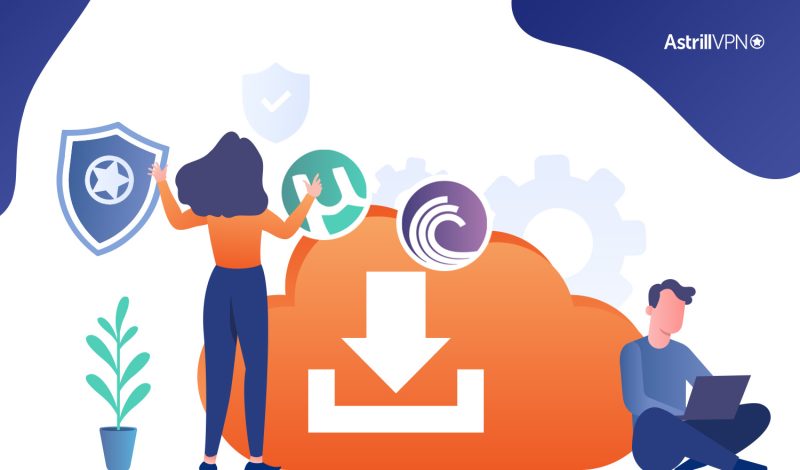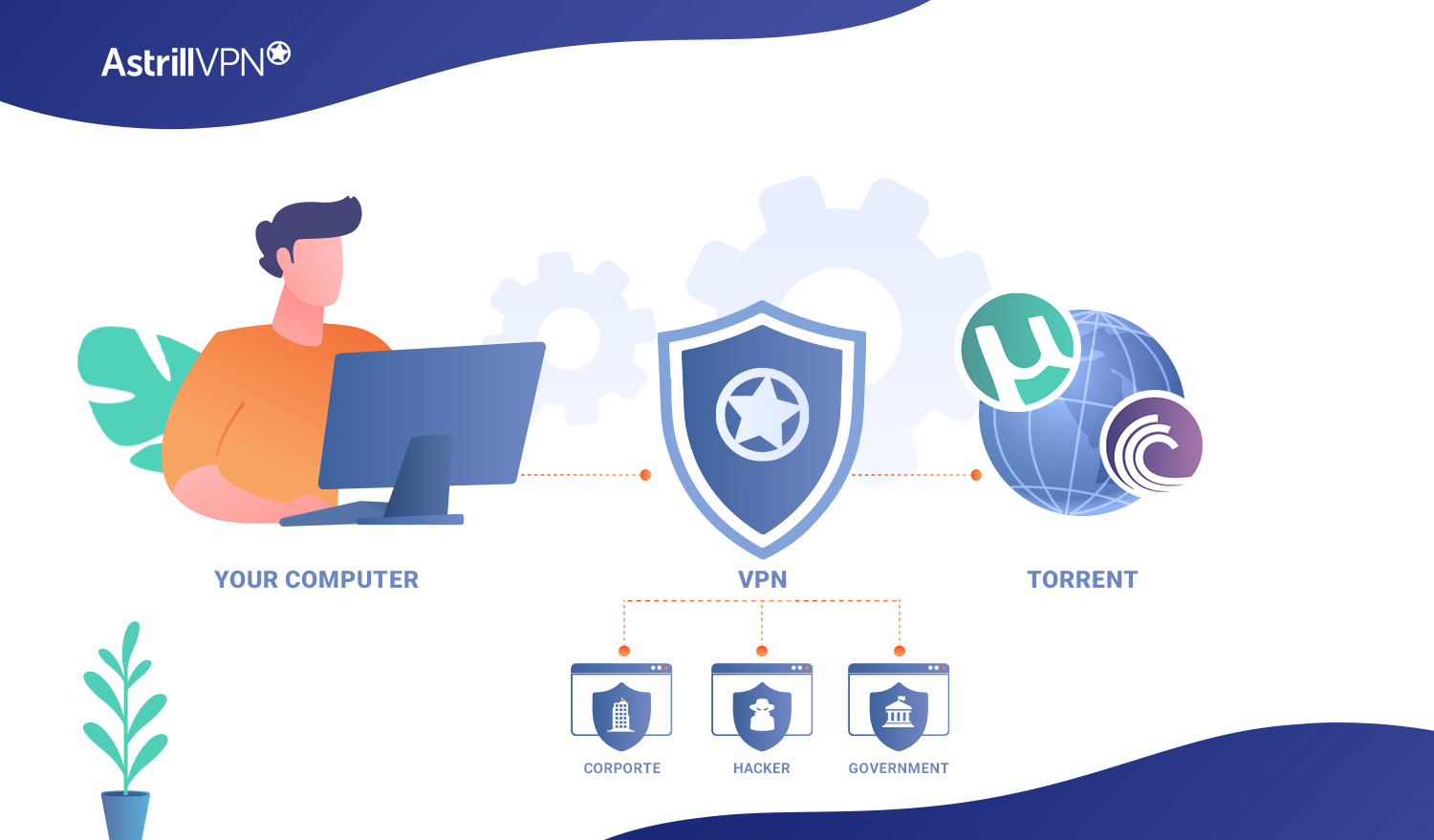Why use a VPN for Torrenting? And How Does It Work?

Although it may be hard to believe, your ISP can see virtually all your internet activities without hassle. It means your private information may be shared or sold to third parties. The government or marketing firms are potentially included among these unnamed parties.
In this scenario, downloading and sharing a torrent file increases the risk of having personal information collected without your knowledge and permission. Therefore, it is essential to ensure that no one accesses your personal information without your knowledge and consent, and VPN is your best bet to ensure your privacy and safety online.
The current article will walk you around the mechanism of torrenting and the VPN’s role in making the torrenting experience safe and smooth for you.
Table of Contents
ToggleWhat is Torrenting?
The term “torrenting” is commonly used to refer to file sharing via a P2P network. With peer-to-peer (P2P) file sharing, users can send and receive files without necessarily storing any of them on a central server. Commonly, all it takes to get a file from the internet onto your computer is to click a “download” button.
But torrenting operates unusually; Instead of downloading an entire file from one server at once, a “torrent” will split the file into smaller pieces, known as “packets.”
All these data packets are stored on one central computer (a “seeder”) and distributed to the other computers in the network. These other computers are your peers. The torrent file automatically switches between servers and keeps track of which user has which packet. By performing the functions of a mini-server, peers help lighten the load on the central server.
On the other hand, when you download something, you also have to upload it, which can significantly impact your connection speed.
How Does Torrenting Work?
Unlike other file-sharing protocols, torrenting doesn’t require using a central server. To make file sharing more accessible, users, or peers, save small portions of individual large files on their own devices. BitTorrent, a peer-to-peer communication protocol, is used for torrenting. It divides files into smaller pieces and distributes them from file splitters (seeders) to file consumers (leechers) using a torrent client. The torrent client is an independent piece of software that decodes torrent files to establish connections between users to share and receive torrents.

Is Torrenting Legal?
Given that it’s just another way to share large files, torrenting is not illegal in and of itself. However, the content of the shared files is a potential minefield. If a user uploads or downloads copyrighted content using a torrent client or website, they may be breaking the law.
It is because the Digital Millennium Copyright Act of 1988 makes it illegal to distribute such content without the owner’s permission. Fines for infringing upon intellectual property can be as high as $150,000 per infringed work.
Moreover, if your ISP suspects that you are using P2P, they may restrict your access to file-sharing sites or limit your bandwidth, which will slow down your connection speed.
Overall, Torrenting is a hazardous endeavor, but there is a WAY OUT! Using a VPN can protect you from any and all of these dangers. Let’s dig deeper into what dangers torrenting can pose to users.
The Dangers of Torrenting
Most torrents pose a little security risk, even when downloaded from a trusted source. For instance, malware-infested torrent files are common and frequently associated with stolen episodes of television shows. Also, sharing a network with hundreds or thousands of strangers is risky when torrenting, as malware could be anywhere. Again, VPN can keep you safe from the associated threats that come with torrenting. So, what is a torrent VPN?
Online Streaming vs. Torrenting
Torrenting refers to sending and receiving large files (torrents) through a network. Torrent clients are software tools that facilitate this kind of search and download. The important aspect is that you get the complete file from one location and pieces from many different people. As a result, huge downloads are completed more quickly, and less load is placed on any server.
In streaming, you can access content stored on a remote device. You play it back in real time via a constant stream of data. Platforms like Netflix, Hulu, and Amazon are some examples of it.
In terms of legality, both are legal until and unless you are downloading pirated content from torrents or streaming pirated content online. As for the safe part, streaming is a safer option than torrenting because you are not downloading a complete file on your computer. In torrenting, you download the complete file, which can turn out to be infected with viruses and malware.
What is a Torrent VPN?
VPN services explicitly tailored for P2P (peer-to-peer) file sharing are called “Torrent VPNs.” But finding the best one can be difficult due to the many problems uncompetitive providers can experience.
The two significant issues why having a Torrent VPN is necessary are:
- When using torrenting services, user IP leakage is a common problem, which can attract hackers and malware.
- The DMCA, Internet Service Providers (ISPs), and other government agencies have the power to sue for copyright violation and impose a hefty fine if they discover a user’s location has been compromised due to the use of a VPN service that leaks IP addresses or DNS requests.
Choosing the right VPN for torrenting is important because it protects you properly and enhances your torrenting experience.
Following are the things that you have to note when choosing the right VPN for your torrenting:
How to Choose a VPN for Safe Torrenting
Below are the characteristics you should seek in a torrenting VPN:
- For maximum safety, choose a VPN service that uses military-grade encryption (AES-256 bit should be your gold standard).
- Suppose your VPN connection ever drops for any reason. In that case, a kill switch will immediately terminate any open programs and running processes activities to ensure the leak-proof safeguard of your data.
- You need to ensure that your VPN supports torrenting before subscribing.
- A strict no-logging policy is a must for us since we disapprove of VPN providers keeping track of our browsing history, physical location, or IP address. Companies that need to retain track of data vital to maintaining our accounts, such as names and payment details, have more leeway. In order to maintain a competitive edge in the VPN industry, some of the largest providers have begun conducting independent audits of their own privacy policies.
- Picking a VPN that slows you down so much that you can’t get anything done is pointless. So, choose a VPN which is speed-tested.
- Lastly, pick a service provider with plenty of ways to get in touch with helpful representatives if you ever encounter problems. Frequently Asked Questions (FAQ) databases and most firms offer email support lines. However, live chat and phone service are preferable.
AstrillVPN is one of the few VPN services that qualify for torrenting according to all the criteria mentioned. AstrillVPN provides top-notch security and ensures that the user gets an amazing experience in terms of speed and connectivity.
How to Torrent with AstrillVPN in Three Steps
Here is how you can experience smooth and safe torrenting using AstrillVPN:
- Download and install AstrillVPN as it matches the criteria mentioned above.
- Join a VPN server, preferably stationed in a P2P-friendly region.
- Once connected, launch your torrent client and begin torrenting
Why choose AstrillVPN for torrenting?
Key advantages of AstrillVPN that make it the best for torrenting are as follows:
IP address security
AstrillVPN has an extensive server network, with many servers in P2P-friendly regions. Therefore, launching AstrillVPN and connecting to one of its distant VPN servers allows you to mask your IP address and maintain anonymity when downloading files from P2P networks.
Stops Bandwidth Throttling
By using AstrillVPN, your Internet service provider won’t be able to tell that you’re downloading or uploading large files, so they can’t slow your connection down.
Best Encryption for Maximum Anonymity
Sending and receiving P2P files, or any other type of data, using AstrillVPN is done through a secure, encrypted virtual tunnel. AES-256 encryption ensures your data is safe from prying eyes and internet service providers. This type of encryption is essential to ensure no one else is snooping on your communications.
No-log Policy
AstrillVPN is a log-less service, which means it does not keep any logs of your online activities. Because it does not gather user data, it cannot be forced or threatened into disclosing them in any situation.
Is a Free VPN good enough for Torrenting?
Although you can use free VPNs for torrenting, we do not recommend them for the following reasons:
- They do not have a sufficient server network. Therefore, they might not have servers stationed in P2P-friendly regions. It can negatively affect your torrenting.
- They do not follow a no-log policy and save your data and online activity to sell to third parties. Most of these third parties are marketing. These firms then bombard you with marketing material according to your online behavior and interests.
- They don’t have enough features to ensure your online privacy.
- They are not speed-tested and thus can result in sluggish torrenting.
Conclusion
As a quick and easy method of file sharing, torrenting is ideal for multimedia files. By encrypting your connectivity, a virtual private network prevents your Internet service provider (ISP) from seeing what you’re doing online.
However, while VPNs might mask your online footprint, we do not advise using one to download pirated content via BitTorrent as it’s unlawful. But if you want to torrent your latest TikTok outtakes, old vacation photos, and mixtapes, you should use a Virtual Private Network. We recommend AstrillVPN for its reliability, affordability, and speed.
FAQs
Does torrenting become safe with a VPN?
If you are familiar with and trust the P2P network, torrenting with a VPN is secure. Keep your anti-malware software running at all times, and be aware that some people utilize torrent sites to distribute dangerous files.
Can torrenting result in imprisonment?
Using BitTorrent or torrenting is not a crime. It’s important to understand that torrenting is simply a file copy technique that facilitates rapid file transfer across the internet. The law may hold you criminally responsible if you download protected works without authorization.
Why use VPN to torrent media files?
A virtual private network (VPN) will prevent your ISP from seeing what you’re doing online by encrypting your data before it leaves your device.
Is torrenting dangerous?
Without a Virtual Private Network, torrenting presents a number of security risks. File corruption is a major risk while using torrents. Torrents are widely used P2P protocols, making them a prime target for malicious actors such as hackers, malicious advertising, and others attempting to infect users’ computers.


No comments were posted yet